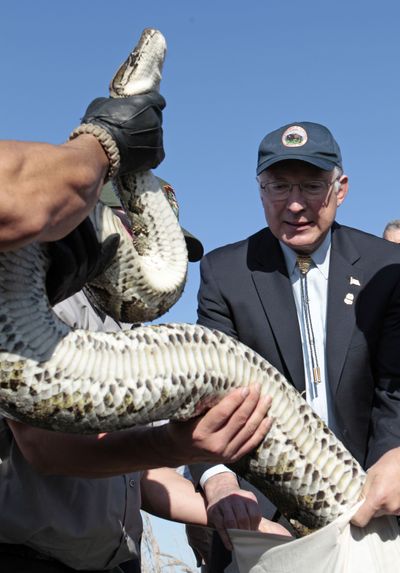U.S. clamps down on exotic snakes
Importation of four species to be banned

MIAMI – The federal government branded the Burmese python, infamous for swallowing a smorgasbord of Everglades critters from rabbits to gators, a serpent non grata on Tuesday.
The action, which will ban the import and interstate sale of the python and three other giant exotic constrictors, was hailed by U.S. Interior Secretary Ken Salazar and Florida Sen. Bill Nelson as a milestone for Everglades protection.
“It does us no good to put in these billions of dollars in investments in the Everglades only to have these giant snakes come and undo all the good we are doing,” said Salazar, who announced the decision during a news conference along Tamiami Trail near an on-going $80 million bridge project that is key to restoring natural water flow in the Everglades.
The reaction was less enthusiastic from environmental and animal welfare groups. They contend the Obama administration watered down a proposal that would have declared nine giant constrictors “injurious species,” bowing to pressure by the pet industry and Republican lawmakers who branded the measure a job-killer based on shaky evidence.
The White House, after reviewing the proposal for more than a year, instead opted to put five of the species on hold for further study. That includes the boa constrictor, one of seven snakes designated by federal scientists as “high-risk” for spreading in the wild but also the most popular and valuable snake in a constrictor market that reptile breeders claim is worth $100 million a year.
“The snakes that were excluded pose a serious threat to our already fragile ecosystems and to humans,” said Peter Jenkins, an attorney for the National Environmental Coalition on Invasive Species. “If your boat is leaking, why would you only plug some of the holes?”
But Salazar and Nelson, a Democrat, defended the action, saying the four snakes that will be banned – the Burmese python, two species of African python and the yellow anaconda – represented the most “clear and present danger” and were at the highest risk of spreading beyond South Florida.
Biologists estimate there are now thousands of Burmese pythons in the Everglades, where they prey on native wildlife and pose a serious threat to the natural balance of a complex system. North African rock pythons and at least one yellow anaconda also have been pulled from lands bordering the Glades.